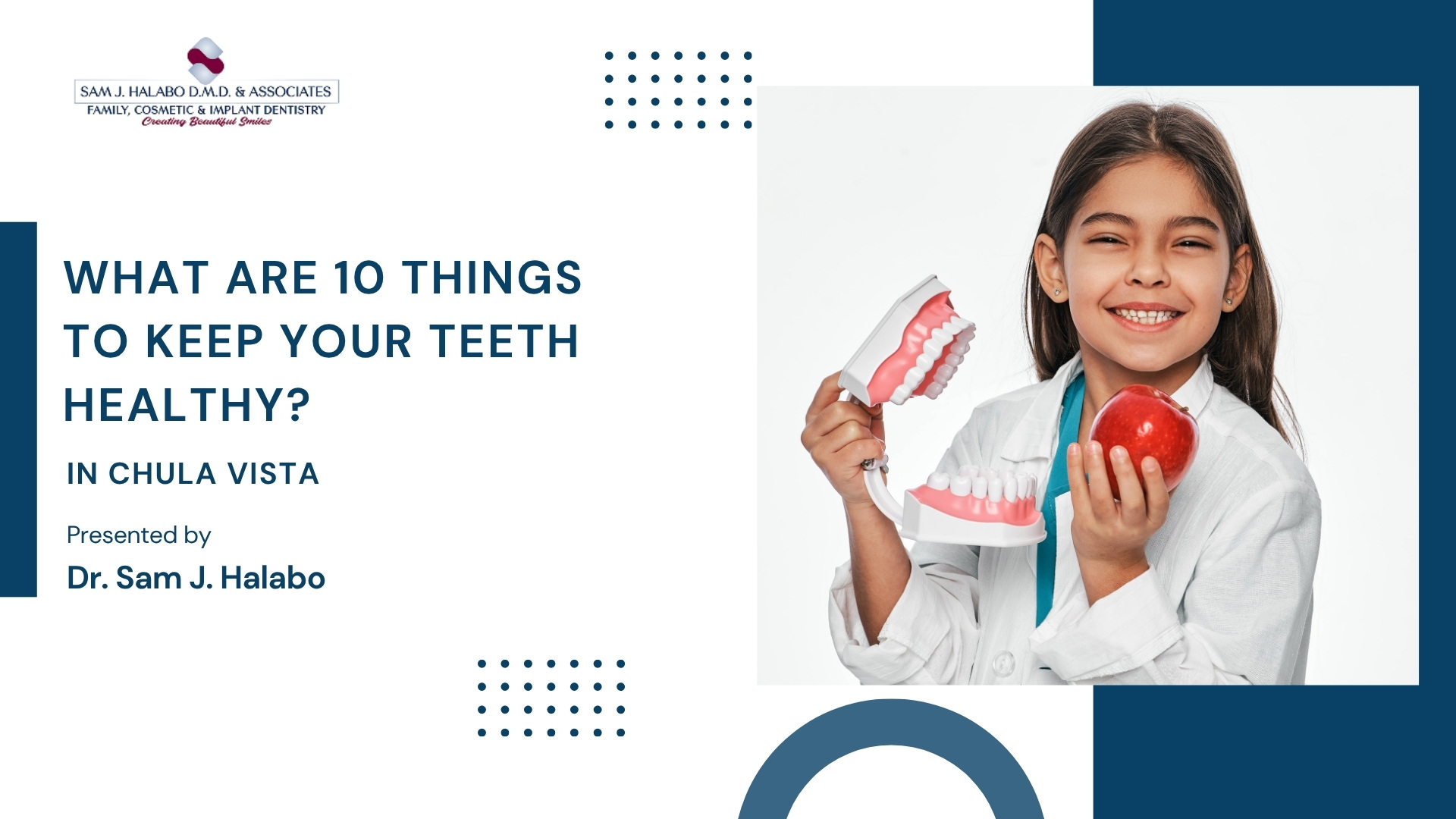🦷 Quick Navigation
- 🪥 1. Brush Twice a Day
- 🧵 2. Floss Every Day
- 🫧 3. Use Mouthwash
- 🥗 4. Stick to a Smile-Safe Diet
- 💧 5. Stay Hydrated
- 🚭 6. Avoid Tobacco Products
- 🦷 7. Stay Consistent with Your Dental Checkups
- 🧼 8. Prevent Plaque and Tartar Buildup
- ⚠️ 9. Know the Signs of Dental Trouble
- 🥊 10. Wear a Mouth guard If Needed
- 🌟 Preventive Care Reminder
You don’t have to make having healthy teeth complicated. With the right few habits, you can keep your smile safe and steer clear of issues such as cavities, gum disease, or tooth loss. If you need advice from an experienced dentist in Chula Vista, the following are 10 key things to emphasize to ensure long-term oral health.
1. Brush Twice a Day
Mornings and before bed, brushing removes food and plaque. Be sure to brush with a fluoride toothpaste for two minutes.
Tips:
- Choose gentle bristles for safer brushing.
- Brush all surfaces front, back, and chewing sides
- Replace your toothbrush every 3 months
2. Floss Every Day
Flossing gets rid of plaque in between your teeth and along the gumline where your toothbrush can’t.
Benefits:
- Prevents gum inflammation
- Decreases risk of cavities
- Makes your breath fresh
3. Use Mouthwash
Mouthwash incorporated into your oral hygiene can contribute to the general cleanliness of your mouth. Rinsing after brushing teeth and flossing helps to clean out bacteria and remove bacteria from hard-to-reach areas.
Mouthwash benefits for oral health are:
- Eliminates bad breath
- Prevents bacterial growth
- Prevents gingivitis and plaque
4. Stick to a Smile-Safe Diet
A balanced diet can support strong teeth and gums. Limit sugary and tangy foods to keep enamel strong.
Tooth-healthy foods include:
- Cheese, milk, and yogurt
- Nuts and leafy greens
5. Stay Hydrated
Drinking water helps wash away food particles and neutralize acid in your mouth.
Why it matters:
- Promotes saliva flow
- Cleans away hidden gunk
- Supports enamel strength
6. Avoid Tobacco Products
Tobacco use raises your chances of gum problems and mouth cancer. It also stains your teeth and causes bad breath.
Better choices:
- Stop consuming Tobacco
- Choose nicotine-free alternatives
- Seek help from a healthcare provider if needed
7. Stay Consistent with Your Dental Checkups
Seeing a dentist near you every six months helps catch small problems before they become major ones. Cleanings also remove hardened plaque.
Regular visits include:
- Checkups and X-rays
- Professional cleanings
- Treatment advice tailored to your needs
8. Prevent Plaque and Tartar Buildup
Plaque is a sticky film of bacteria, and if left unchecked, it hardens into tartar, which can only be removed by a dental professional.
Here’s how to focus on plaque and tartar prevention:
- Brush and floss every day
- Use antibacterial mouthwash
- See your dental team twice a year for a fresh start.
9. Know the Signs of Dental Trouble
Spotting early issues can help prevent bigger problems later. Look out for the signs of poor dental health so you can act quickly.
Common warning signs:
- Bleeding gums
- Persistent bad breath
- Tooth sensitivity or pain
- Unstable or misaligned teeth
10. Wear a Mouth guard If Needed
If you grind your teeth or play sports, a mouth guard can prevent damage to your teeth and jaw.
Benefits of a custom mouth guard:
- Helps avoid tooth damage
- Reduces jaw strain
- Protects dental work like braces or crowns
Don’t Wait for Pain; Stay Ahead with Preventive Care!
Daily care for your teeth avoids costly and painful dental issues down the road. For personalized advice and expert care, rely on Sam J. Halabo, DMD & Associates today. Your healthy smile begins with healthy habits and an excellent team of dentists in your corner.
❓ FAQs
👉 Can I get by with mouthwash instead of brushing?
No. Mouthwash is supplementing brushing, not replacing it. Brushing and flossing are still the most critical steps.
👉 How often should I visit the dentist?
At least once every six months. More often if you have gum disease or other chronic conditions.
👉 What can I avoid eating for improved dental health?
Reduce candy, sodas, citrus fruits, and chips, they cling to teeth and lead to decay.
👉 Are electric toothbrushes better?
Electric toothbrushes remove more plaque and are easier on those with impaired hand mobility.
👉 What if I have bleeding gums after flossing?
It can be a sign of inflammation of the gums. Continue flossing gently, and discuss it with your dentist if the bleeding persists.





